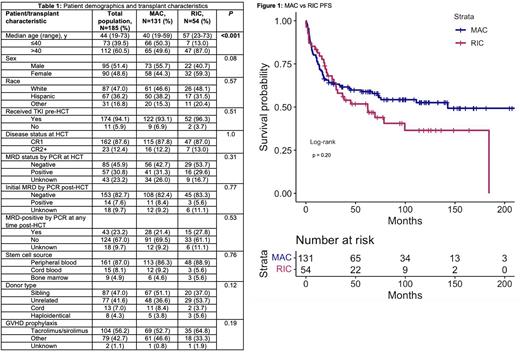Abstract
Background: Philadelphia-chromosome positive acute lymphoblastic leukemia (Ph+ ALL) has historically been associated with a poor prognosis. Allogeneic hematopoietic cell transplantation (HCT) is recommended in first complete remission (CR1). Strategies to decrease non-relapse mortality (NRM) and to increase the number of patients eligible to receive HCT have led to the utilization of reduced intensity conditioning (RIC) for patients unfit or too old for myeloablative conditioning (MAC), at the cost of a higher risk of relapse. Limited data exist comparing MAC vs. RIC HCT in Ph+ ALL. Here, we compared the outcomes of MAC- and RIC-HCT in Ph+ ALL.
Methods: This was a single-center retrospective study examining patients with Ph+ ALL who underwent HCT from 2000-2019. The primary endpoint was progression free survival (PFS), while secondary endpoints include overall survival (OS), graft versus host disease free survival (GRFS), non-relapse mortality (NRM), and cumulative incidence of relapse (CIR), and GVHD. Survival estimates were calculated using the Kaplan-Meier method and differences were examined by the log-rank test. CIR and NRM were calculated using a competing risk analysis and differences were examined by Gray's test.
Results: 185 patients were included, of whom, 131 (70.8%) underwent MAC, 128 (97.7%) of whom received total body irradiation (TBI)-based treatment, while 54 (29.2%) underwent RIC, 45 (83.3%) of whom received fludarabine plus melphalan (Flu/Mel). The median age (range) of the patients receiving MAC and RIC were 40 years (19-59) and 57 years (23-73), respectively. 66 (50.3%) vs 7 (13.0%) were ≤40 years in the MAC vs RIC groups (P<0.001). 66 (50.4%) vs 38 (70.4%) in the MAC vs RIC groups underwent HCT ≥2010. 115 (87.8%) vs 47 (87.0%) were in CR1 at the time of HCT in the MAC vs RIC groups (P=1.0), and 41 (31.3%) vs 16 (29.6) had measurable residual disease (MRD) by PCR at the time of HCT, although 34 (26.0%) vs 9 (16.7%) did not have a MRD pre-HCT report available (P=0.31), respectively. 110 (59.5%) received tyrosine kinase inhibitor (TKI) maintenance post-HCT, 73 (55.7%) in the MAC group vs 37 (68.5%) in the RIC group (P=0.14). The rest of their baseline characteristics are described in Table 1. In a sub-analysis of patients in MRD-negative CR1 at HCT, there was no statistically significant difference in 4-year PFS between MAC vs RIC, 71.1% vs 55.7% (P=0.12). PFS was similar in patients receiving TKI maintenance regardless of whether they received MAC vs RIC, hazard ratio 1.73 (95% confidence interval, 0.93-3.22; P=0.08). The 4-year NRM, CIR, and GVHD with MAC vs RIC were 25.6% vs 26.8% (P=0.50), 14.5% vs 21.4% (P=0.27), and 48.4% vs 46.3% (P=0.75), respectively.
Conclusions: Patients with Ph+ ALL had similar PFS, OS, and GRFS when treated with MAC vs RIC. RIC-HCT is appropriate in those who would not be expected to tolerate MAC and may also be an acceptable strategy for younger patients when TKI maintenance post-HCT is administered.
Disclosures
Koller:Treadwell Therapeutics: Other: Safety Review Committee; Takeda: Speakers Bureau; Novartis: Consultancy, Membership on an entity's Board of Directors or advisory committees, Speakers Bureau. Al Malki:CareDx: Consultancy, Research Funding; Incyte: Consultancy, Research Funding; Miltenyi Biotec: Consultancy, Research Funding; Hasna Biopharma: Membership on an entity's Board of Directors or advisory committees; NexImmune: Consultancy, Research Funding; Gilead: Consultancy, Research Funding. Salhotra:BMS: Research Funding; Kadmon: Other: Advisory board meeting ; Orca Bio: Research Funding. Ali:Abbvie: Membership on an entity's Board of Directors or advisory committees; Bristol Myers Squibb: Membership on an entity's Board of Directors or advisory committees; Incyte Corporation: Membership on an entity's Board of Directors or advisory committees, Speakers Bureau. Aribi:SeaGen: Consultancy. Ball:Oncovalent: Membership on an entity's Board of Directors or advisory committees. Artz:Abbvie: Honoraria; Magenta: Honoraria. Marcucci:Abbvie: Other: Speaker and advisory scientific board meetings; Novartis: Other: Speaker and advisory scientific board meetings; Agios: Other: Speaker and advisory scientific board meetings. Stein:Amgen: Speakers Bureau. Nakamura:Sanofi: Consultancy; Magenta Therapeutics: Consultancy; Helocyte Inc: Research Funding; Kadmon: Consultancy; Omeros: Consultancy; BluebirdBio: Consultancy. Pullarkat:AbbVie, Amgen, Genentech, Jazz Pharmaceuticals, Novartis, Pfizer, and Servier: Membership on an entity's Board of Directors or advisory committees, Speakers Bureau; Amgen, Dova, and Novartis: Consultancy, Other: Advisory Board Member. Aldoss:AbbVie: Consultancy, Research Funding; Jazz Pharmaceuticals: Honoraria, Speakers Bureau; Autolus Limited: Consultancy; Amgen: Consultancy; Agios: Consultancy, Honoraria; Kite: Consultancy. Mei:Celgene: Research Funding; Incyte: Research Funding; Beigene: Research Funding; Morphosys: Research Funding, Speakers Bureau; CTI: Honoraria; Novartis: Consultancy; EUSA: Honoraria.
OffLabel Disclosure:
Fludarabine and melphalan use in ALL is off label.
Author notes
Asterisk with author names denotes non-ASH members.


This feature is available to Subscribers Only
Sign In or Create an Account Close Modal